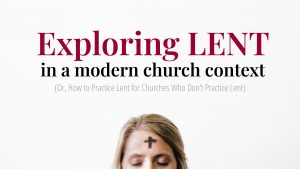Note: This is a guest post by Rob Still, one of our Worship Workshop faculty. Learn more about Rob at the end of this article.
“What’s that on her forehead?” you’re thinking to yourself when you see someone with a big dirt smudge above her eyebrows.
“Why is everyone advertising fish sandwiches?” as you drive past a row of fast food restaurants.
And as you scroll through your social media feed, “Why did my Catholic friend just announce that she’s giving up Facebook for the next 40 days?”
Don’t worry. It’s just Lent.
If you grew up like I did in a “Chreaster” church, we didn’t celebrate any Christian holidays besides the Big Two:
Christmas and Easter.
But Lent? No way.
Epiphany? What is that?
Advent? Isn’t that a wreath?
Other than the Big Two, most churches just ignore the Christian calendar completely. Some traditions don’t even know there is a Christian calendar.
However, many years now into my journey as worship leader, I’ve discovered that following the rhythms of the Christian year calendar provides a vibrant and consistent method of Christ-centered discipleship and spiritual growth.
And observing Lent can be particularly meaningful for the spiritual journey of both individuals and churches. So, this article is a sort of micro crash course exploring the blessings and benefits of Lent for those who’ve never celebrated it.
What Is Lent?
Lent is a season of repentance, lament, and preparation often accompanied by fasting. Lent begins on Ash Wednesday, which varies every year, usually in February or March, and ends on Palm Sunday one week before Easter Sunday. The resurrection of Jesus is the formative event in the church calendar year, and Resurrection Sunday (aka Easter) typically falls between March 22 and April 25.
 Free Lent Workshop
Free Lent Workshop
Want to explore Lent more deeply? Watch this free workshop (no sign-up required):
Access the “Exploring Lent Workshop”
Spiritual Formational Themes of Lent
When describing the purpose of Lent, Robert Webber wrote that “Lent calls us back to God, back to basics, back to the spiritual realities of life. It calls on us to put to death the sin and the indifference we have in our hearts toward God and our fellow persons. And it beckons us to enter once again into the joy of the Lord–the joy of a new life born out of a death to the old life” (Webber, 2004, p.99).
Lent is a time of remembering the story of Christ as he begins His journey to the cross. It is a time of reflection, to intentionally focus on the spiritual realities of life.
Lent challenges us to put to death our sin and apathy towards God and others. But Lent is also an opportunity to re-experience the joys of God’s atonement, forgiveness, and ultimate redemption.
Historical Origins and Themes of Lent
The observation of Easter as a holy event originated with the early first century Christian church. New believers would traditionally be baptized on Easter Sunday.
For a period of forty days prior to baptism, they would participate in the catechumen, a time of discipleship training to learn what the Christian faith is all about. Catechumen was also a time of fasting. The imposition of ashes really wasn’t widespread until the Middle Ages.
Instructions for Ash Wednesday Leading to Lent
The Book of Common Prayer offers these instructions regarding Lent and Ash Wednesday.
Dear People of God. The first Christians observed with great devotion the days of our Lord’s passion and resurrection, and it became the custom of the Church to prepare for them by a season of penitence and fasting.
This season of Lent provided a time in which converts to the faith were prepared for Holy Baptism. It was also a time when those who, because of notorious sins, had been separated from the body of the faithful were reconciled by penitence and forgiveness, and restored to the fellowship of the Church.
Thereby, the whole congregation was put in mind of the message of pardon and absolution set forth in the Gospel of our Savior, and of the need which all Christians continually have to renew their repentance and faith.
I invite you, therefore, in the name of the Church, to the observance of a holy Lent, by self-examination and repentance; by prayer, fasting, and self-denial; and by reading and meditating on God’s Holy Word. And, to make a right beginning of repentance, and as a mark of our mortal nature, let us now kneel before the Lord, our maker and redeemer.
If ashes are to be imposed, the Celebrant says the following prayer:
“Almighty God, you have created us out of the dust of the earth: Grant that these ashes may be to us a sign of our mortality and penitence, that we may remember that it is only by your gracious gift that we are given everlasting life through Jesus Christ our Savior. Amen. The ashes are imposed with the following words. Remember that you are dust, and to dust you shall return.”
(From the Book of Common Prayer, 1550-1660, revised 1970.)
During Lent, the entire church community is called to participate and prepare for “the days of the Lord’s passion and resurrection.” The imposition of ashes is a sign of both humility and commitment. Our attitude is that “this is not church as usual. We will remember and identify with Jesus.”
Suggestions for Study Topics and Themes
Lent is an opportunity to go deeper in studying the word of God for the purpose of spiritual formation. Some ideas of study themes during Lent include:
- Follow the weekly Lectionary texts — available here.
- Do a self-study of the timeline of Jesus’ narrative for the scripture portions that occurred before Palm Sunday.
- Study the Psalms of Lament. A few include: Psalm 13, 31, 51, 60, 74, 79, 80, 85, 86, 90.
- Study the healing ministry of Jesus focused on his miracles of deliverance and healing.
- Do a self-study of the catechumen based on the Apostles Creed. You might check out R. Albert Mohler, The Apostles’ Creed (Nashville: Thomas Nelson, 2019).
Music/Song Suggestions
In general, songs with a theme of repentance and commitment would be appropriate. As always, contextualize the music and creative elements for your community of faith. Here are a few ideas to consider.
Hymns
- Come Ye Sinners Poor and Needy
- Just As I Am
- Only Trust Him
- My Hope Is Built On Nothing Less
- Be Thou My Vision
- Jesus Paid It All
- When I Survey The Wondrous Cross
- My Faith Looks Up To Thee
Modern Songs
- Graves Into Gardens
- Beautiful Things (Gungor)
- Lead Me To The Cross
- “Older Contemporary”
- Change My Heart Oh God
- Purify My Heart
- Create In Me A Pure Heart
I hope you find this article helpful for deepening your spiritual growth during the season of Lent, whether you are a novice or a veteran in following the practices of the Christian year calendar.
Rob Still
Robstill.com
Catch Rob’s daily worship livestream, Just Worshipin’, an informal time of devotional worship every Monday, Tuesday, Thursday, and Friday at 8 AM CT on Facebook and YouTube.
Also, get Rob’s free pdf: Worship Actions and Attitudes:10 Hebrew Words For Praise and Worship.
Stuck?
Learn how to level-up your team with this free video training.







